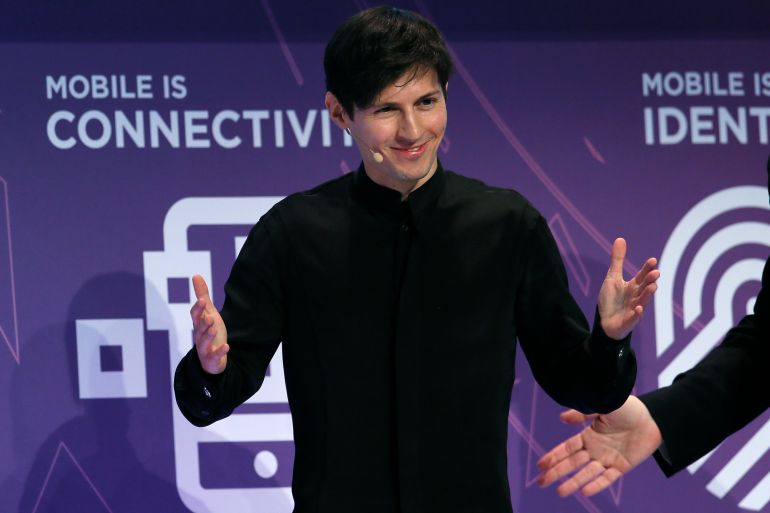Telegram’s Pavel Durov transferred to French court to face possible charges
Investigating judge ends Durov’s police custody and will have him brought to court, Paris prosecutor’s office says.
The founder and CEO of Telegram, Pavel Durov, delivers a keynote speech during the Mobile World Congress in Barcelona, Spain [File: Albert Gea/Reuters]Published On 28 Aug 202428 Aug 2024
Russian-born Telegram boss Pavel Durov has been sent to see a French investigative judge who is due to decide whether to place him under formal investigation after his arrest as part of a probe into organised crime on the social media and messaging app.
Durov’s detention after he landed in Paris on a private jet on Saturday has put the spotlight on the criminal liability of app providers and fuelled debate on where freedom of speech ends and enforcement of the law begins.
Keep reading
list of 3 itemsend of list
“An investigating judge has ended Pavel Durov’s police custody and will have him brought to court for a first appearance and a possible indictment,” a statement from the Paris Prosecutor’s Office said on Wednesday.
Being placed under formal investigation in France does not imply guilt or necessarily lead to trial but indicates that judges consider there is enough to the case to proceed with the probe. Investigations can last years before being sent to trial or shelved.
The judge’s decision was expected by 8pm (18:00 GMT), 96 hours after Durov was taken into custody, the maximum period he can be detained before a decision is made.
If Durov, who is a French citizen, is placed under formal investigation, judges will also decide whether to put him in pretrial detention. One factor they will consider is whether he could try to flee.
The overall investigation at this stage is directed against unspecified people. It focuses on suspected complicity in crimes, including running an online platform that allows illicit transactions, possessing images of child sex abuse, drug trafficking, fraud, refusing to pass information to authorities and providing cryptographic services to criminals, prosecutors said.
The prosecutor’s office did not say which crime or crimes Durov himself might be suspected of.
Durov’s French lawyer did not reply to repeated requests from the Reuters news agency for comment.
In a statement on Monday, Telegram said it abided by European Union laws and its moderation was “within industry standards and constantly improving”.
“Telegram’s CEO Pavel Durov has nothing to hide and travels frequently in Europe,” it said. “It is absurd to claim that a platform, or its owner, are responsible for abuse of that platform.”
In addition to Russia and France, Durov is also a citizen of the United Arab Emirates and the Caribbean island nation of St. Kitts and Nevis.
The UAE Foreign Ministry said Tuesday that it was “closely following the case” and had asked France to provide Durov “with all the necessary consular services in an urgent manner.”
Kremlin spokesman Dmitry Peskov said he hoped that Durov “has all the necessary opportunities for his legal defence” and added that Moscow stands “ready to provide all necessary assistance and support” to the Telegram CEO as a Russian citizen.
“But the situation is complicated by the fact that he is also a citizen of France,” Peskov said.
Faced with accusations from Russia and X owner Elon Musk that France is stifling freedom of speech with Durov’s arrest, President Emmanuel Macron took the unusual step on Monday of posting on X about what he called “false information”.
Macron said Monday that Durov’s arrest wasn’t a political move but part of an independent investigation. Macron wrote that his country “is deeply committed” to freedom of expression but “freedoms are upheld within a legal framework, both on social media and in real life, to protect citizens and respect their fundamental rights.”
